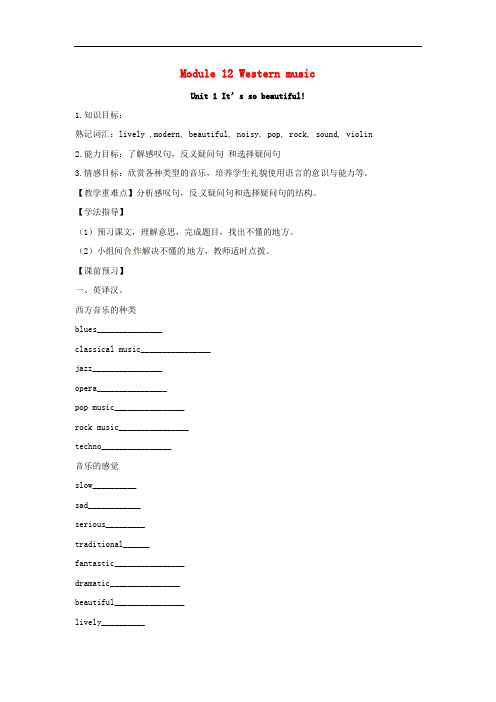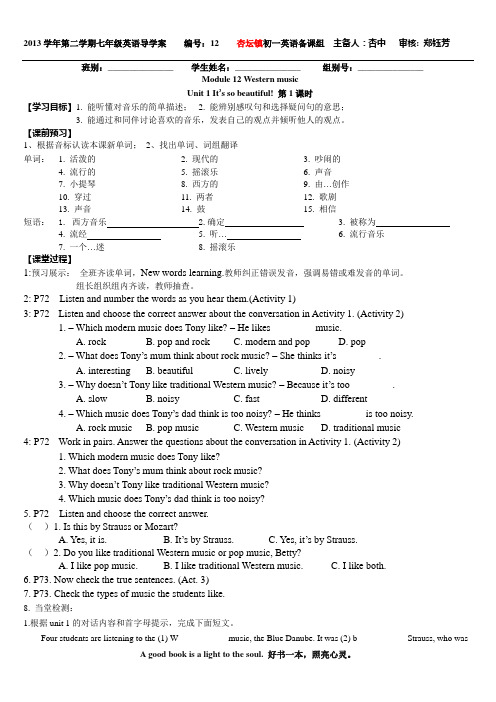七年级下Module12 Unit1导学案
- 格式:doc
- 大小:34.50 KB
- 文档页数:2

Module 12 Western musicUnit 1 It’s so beautiful!1.知识目标:熟记词汇:lively ,modern, beautiful, noisy, pop, rock, sound, violin2.能力目标:了解感叹句,反义疑问句和选择疑问句3.情感目标:欣赏各种类型的音乐,培养学生礼貌使用语言的意识与能力等。
【教学重难点】分析感叹句,反义疑问句和选择疑问句的结构。
【学法指导】(1)预习课文,理解意思,完成题目,找出不懂的地方。
(2)小组间合作解决不懂的地方,教师适时点拨。
【课前预习】一、英译汉。
西方音乐的种类blues_______________classical music________________jazz________________opera________________pop music________________rock music________________techno________________音乐的感觉slow__________sad____________serious_________traditional______fantastic________________dramatic________________beautiful________________lively__________noisy__________modern____________二、反意疑问句的定义:1.反意疑问句又叫附加疑问句,是指当提问的人对前面所叙述的事实不敢肯定,而需要向对方加以证实时所提出的问句。
2.结构为:前一部分是一个陈述句,后一部分是一个简单的问句(助动词/情态动词或系动词be(肯定或否定)+主语(代词)3. 反意疑问句构成应注意以下几点:①前面的陈述句如果是肯定的,反意疑问句就要用否定形式;如果是否定的,反意疑问句就用肯定形式。

【课型】:读写课【学习目标】1、知识目标:本单元的词汇,感叹句和选择疑问句2.能力目标:能读懂有关音乐及人物描写方面的文章,掌握介绍人物的方法。
3.情感目标:培养礼貌使用语言的能力,表达不同意见时顾及他人的感受。
【学法指导】自主预习,合作探究?课文课文102-103页模块12感叹句和选择疑问句。
【学习重难点】感叹句和选择疑问句【课前自主预习—思考】一.大声朗读课文的对话,自主找一找对话里出现的感叹句和选择疑问句,并理解其用法。
二、预习课文,完成下列的词组翻译。
(来做个小小翻译家哦)1.European_____________2. musician ____________3. composer________________4. classical music ___________5. elder____________6. century______________7. 华尔兹舞(曲)___________________ 8. 舞曲______________9. 又一个;再一个____________________ 10。
完美的_________________11(写作、音乐或艺术的)作品_____________ 12. 贫穷的_________________13.美丽又古老的城市_________________________ 14.重要的_____________15他是一位了不起的欧洲音乐家。
___________________________________________三、阅读文章,尝试完成课文75页的相应的活动。
【小组合作探究】让我们一起走进知识的殿堂吧!(课内知识探究)1. His dance music made him famous all over Europe.他的舞曲使他享誉全欧洲。
【探究一】make 的常见用法:(1) make sb. do sth. 使某人做某事make sb. not do sth. 使某人不做某事Parents always__________________________many things. 父母总是使他们的孩子学习很多东西。

班别:_______________ 学生姓名:_______________ 组别号:_______________Module 12 Western musicUnit 1 It’s so beautiful! 第1课时【学习目标】1. 能听懂对音乐的简单描述; 2. 能辨别感叹句和选择疑问句的意思;3. 能通过和同伴讨论喜欢的音乐,发表自己的观点并倾听他人的观点。
【课前预习】1、根据音标认读本课新单词;2、找出单词、词组翻译单词: 1. 活泼的__________________ 2. 现代的__________________ 3. 吵闹的__________________4. 流行的__________________5. 摇滚乐__________________6. 声音__________________7. 小提琴__________________ 8. 西方的__________________ 9. 由…创作__________________10. 穿过__________________ 11. 两者__________________ 12. 歌剧__________________13. 声音__________________ 14. 鼓__________________ 15. 相信__________________短语: 1. 西方音乐 2.确定 3. 被称为4. 流经5. 听…6. 流行音乐______________7. 一个…迷__________________ 8. 摇滚乐__________________【课堂过程】1:预习展示:全班齐读单词,New words learning.教师纠正错误发音,强调易错或难发音的单词。
组长组织组内齐读,教师抽查。
2: P72 Listen and number the words as you hear them.(Activity 1)3: P72 Listen and choose the correct answer about the conversation in Activity 1. (Activity 2)1. – Which modern music does Tony like? – He likes ________ music.A. rockB. pop and rockC. modern and popD. pop2. – What does Tony’s mum think about rock music? – She thinks it’s ________.A. interestingB. beautifulC. livelyD. noisy3. – Why doesn’t Tony like traditional Western music? – Because it’s too ________.A. slowB. noisyC. fastD. different4. – Which music does Tony’s dad think is too noisy? – He thinks ________ is too noisy.A. rock musicB. pop musicC. Western musicD. traditional music4: P72 Work in pairs. Answer the questions about the conversation in Activity 1. (Activity 2)1. Which modern music does Tony like? _______________________________________2. What does Tony’s mum think about rock music? ____________________________________3. Why doesn’t Tony like traditional Western music? ___________________________________4. Which music does Tony’s dad think is too noisy? ____________________________________5. P72 Listen and choose the correct answer.()1. Is this by Strauss or Mozart?A. Yes, it is.B. It’s by Strauss.C. Yes, it’s by Strauss.()2. Do you like traditional Western music or pop music, Betty?A. I like pop music.B. I like traditional Western music.C. I like both.6. P73. Now check the true sentences. (Act. 3)7. P73. Check the types of music the students like.8. 当堂检测:1.根据unit 1的对话内容和首字母提示,完成下面短文。

人教版七年级英语下册导学案Unit 12 What did you do last weekend? Section A1 导学案【教学目标】1. 知识目标:单词和短语:camp, lake, beach, badminton, sheep, as, natural, butterfly, visitor, tired, stay, stay up late.句型:(1) —Where did you do last weekend, Lucy?—I went to summer camp.(2) —How was your weekend?—Pretty good, thanks(3)—I worked as a guide at the Natural History Museum.—How interesting!2.技能目标:(1) Talk about recent past events(2) Practice students’ listening, speaking, reading and writing skills.3.情感目标:(1) 帮助学生树立合作学习观点。
(2) 讲述美好的周末,树立学生享受生活,热爱美好的大自然情感。
【学习过程】任务一:Warm upThis activity introduces the key vocabulary.Focus attention on the picture. Ask students to tell what they see. Name each activity and ask students to repeat: did my homework, went to the cinema, went boating, camped by the lake, went to the beach, played badminton.Point out the numbered list of activities. Say each one again and ask students to repeat.Then ask students to match each activity with one of the pictures. Say, Write the letter of each activity next to the words. Point out the sample answer.Check the answers.任务二:ListeningWork on 1bThis activity gives students practice in understanding the target language in spoken conversation.Point to the activities in the picture in activity la. Ask students to tell what the person did in each picture. For example, She played badminton, or Lucy went to the cinema. Play the recording the first time. Students only listen.Play the recording a second time. This time say. Listen to the recording and write the days and times Lucy did each thing under the pictures. Point out the sample answer under the picture of Lucy playing badminton; on Saturday morning.Correct the answers.任务三:Pair workWork on 1cThis activity provides guided oral practice using the target language.Point to the example conversation. Ask two students to read the dialogue to the class.Say, Now work with a partner. Student A, pretend to be Lucy. Student B, ask questions about what Lucy did on different days and times over the weekend. Talk about the activities in the picture.Students work in pairs. As they talk, move around the room monitoring their work. Offer language or pronunciation support as needed任务四:ListeningWork on 2a:This activity gives students practice in understanding the key vocabulary in spoken conversation.Point to the five sentences and ask a student to read these sentences to the class.You will hear recording of a conversation. The people will talk about some of the activities and people, but they will not talk about others. Please underline the words you hear on the recording.Play the recording the first time. Students only listen.Play the recording a second time. This time, ask students to underline each word that is saidon the tape. Point out the sample answer, grandmother.Correct the answers.1grandma 2 homework 3 English 4 farm 5 cows任务五:ListeningWork on 2b:This activity provides listening practice using the target language.Call attention to the pictures of Carol, Becky, and Jack and ask students to identify each person by name.Now I will play the recording again. Listen to the students talking about what they did over the weekend. Write C for Carol, B for B Becky or J for Jack next to each statement in activity 2a. The first one has been done for you.Play the recording the first time. Students only listen.Point out the sample answer, S, in statement 1. Say, Sonia visited her grandmother.Play the recording again. Ask students to write a letter in front of each statement to show what each person did.Check the answers. B B C J J任务六:Pair workAsk and answer in pairs.Point to the example conversation. Ask two students to read the dialogue to the class.Say, Now work with a partner. Student A, ask questions about what, who or where, Student B answers. Students work in pairs.任务七:Roleplay the conversation.1. Ask Ss to look at conversation in 2d. Then Ss read the dialogue by themselves and find the answer to these questions:(1) What did Lisa do on her weekend?(2) What did Paul do on his weekend?2. Ss work in pairs and roleplay the conversations.3. Have several pairs perform their conversations for the rest of the class.Unit 12 What did you do last weekend? Section A2 导学案【教学目标】1. 知识目标:单词和短语:away, mouse, baby, shout, woof, language,run away, shout at, last weekend, go boating, last weekend句型:(1)What did you do last weekend?(2)I did my homework.(3)Who visited her grandma?(4)Where did she go last weekend?(5)She went to a farm.(6)Who did she go with?(7)She went with her classmates.2.技能目标:(1)Talk about recent past events(2)Practice students’ listening, speaking, reading and writing skills.3.情感目标:(1)提高学生独立学习能力。

Listen, look and guess.1)-----What kind of music is this?It is _______________ . The _____ (声音)is very ______(不同的)and __________(极好的,绝妙的).2)It is _______________ .It is______(现代的), _____(吵闹的)and_________(快的).3)It is _______________ .It is______(轻快的).4)It is ______________________________ . It is_______(美妙的)and ____(慢的).You can hear the ______(小提琴) and piano.听力:Listen again and match. What kind of music do the family like?Tony traditional Western musicTony’s dad rock musicTony’s mum pop musicNow listen again and answer1). Which modern music does Tony like?2). What does Tony’s mum think about rock music?3).Why doesn’t Tony like traditional Western music?3). Which music does Tony’s dad think is too noisy?课文听力:Listen to part 1 and answer.1. Is the music beautiful? A. Yes, it is B. No, it isn’t C. I don’t know.2. Who is the music by? A. Mozart B. Strauss C. BeethovenListen to part 2 and answer1. Vienna is the capital of _________.A.America B. Australia C. Austria2. Strauss was not _____, he was _____.A. Austrian;GermanB. German; Austrian ['ɒstriən]C. German; Australian['ɒstreɪliən]3. The Danube is a river in ___and goes through___.A. Europe; ViennaB. Europe; ParisC. America; CarliforniaListen to part 3 and answer知识点:1. ...this is Western music,isn’t it? 此句是一个反意疑问句。

Module 12 Western MusicUnit 1 It, s so beautiful. (1)学习活动教学指导与评价【学习目标】(2')1.通过音标拼读,能准确拼读并熟练掌握本单元词汇。
2.通过设置的问题借助点读笔进行多层听,能够听憧Activity? &3的对话内容,获取准确信息,并完成所设置的问题,能辨别感叹句和选择疑问句的意思。
(重点)3.通过听、读Activity,的对话,小组或同伴进行简单的问答对话练习,正确运用感叹句和选择疑问句表达自己的喜好,并询问他人的喜好。
(难点)【学习过程】一、预习导学:(3,)音标写词并翻译。
].「niDdn] ________________ 2.「no I zi] __________________________________ 3.[pD p] ____________________ 4.[sau nd] _________________________________5.[bou 0] ___________________6.[vo I s] _______________________________7. [bi ' li: vj _____________________ 8.[ro kJ ____________________________9.「Dpro] _____________________ lO.f, 9i gk] _______________________________二、学习活动:导入新课(彳)Let' s listen to the music. Can you describe it? Is it lively or noisy? Is it pop musicor rock music?听力训练(5‘ )(Activity 1 on P72) Listen and number (he words as you hear (hem.(Activity 1 on P72) Answer the questions about the conversation in Activity 1.对话处理多层听(20')一层听:What arc they talking about? 育人目标:通过和同伴讨论喜欢的音乐,发表自己的观点并倾听他人的观点,在表达不同意见时能够照顾他人的感受。
外研版七年级下册-M12-UI导学案Module 12 Western music!Unit 1 It’s so beautiful!【课堂流程】预习与检测(25分钟)课堂互动探究(10分钟)课堂检测(8分钟)总结与反思(2分钟)3、我是个摇滚乐迷。
I’m a __________ _______rock music.4、让我们清净一会儿吧!________ us a _________!5、我简直无法相信! I ________ ___________ it!(3)重点知识点拨Δ认真预习课文102-103页Module12的语法,了解感叹句和选择疑问句的用法。
1、①-- Is this by Strauss or Mozart?-- It’s by Strauss.by 在此意为“由……创作”,此句话应翻译为_______________________________②--- Do you like traditional Western music or pop music?---Well, I like both.结论:以上这种在问句中提供两组或两组以上备选答案的问句叫做选择疑问句。
选择疑问句的结构是“一般疑问句+or+另一个被选对象”,语调为先升后降。
对于这样的问句不能用yes或者no来回答,应该选择其中一个或者同时都选。
而且这里的or所连接的内容是一个并列关系,词性应该统一。
例如:----昨天你呆在家还是在学校?----我呆在家---Did you stayed at home ______ at school?---(I stayed) at home.2、What a beautiful city!此句话是感叹句,它的结构是:___________+a/an +_________+可数名词单数(+主语+谓语)! =How+形容词+主语+谓语!Eg. ①What a beautiful girl she is !=________beautiful girl _______!②How difficult the questions are!=_________ ________ questions ________ are!3、I also like Beijing opera.also是副词,意为“也,还”位于句中,一般放在助动词、be之后,实义动词之前。
科目英语课型[来源学&科&网]听说课年(班)级学生姓名主备人同伴授课教师授课时间课题:Module 12 Western music Unit1 It’s so beautiful!学习目标:1.能听懂和理解关于音乐的话题的对话。
2.谈论喜欢和不喜欢的话题。
学习重点能听懂和理解关于音乐的话题的对话。
学习难点谈论喜欢和不喜欢的话题。
学习过程(学案)备注[来源学科网Z|X|X|K]【自主学习】1.读Unit1单词,小组合作解决不会读的单词,并能快说汉语意思。
2.预习单词,完成下面句子:(1)Mr.Bai’s classes are l__________ and interesting.[来源学科网](2)Most young people like p________ music.(3)He always lies(撒谎). I don’t b__________ him.(4)Waiter! A_________ cup of coffee, ple ase.(5)No one is p___________.(6)We walked t________ the forest.3.预习对话,找出下列短语,并在书上划出来。
[来源:Z+xx+](1)Western music_____________ (2) the capital of…________________(3)穿过_________________ (4)traditional music_______________(5) pop music_______________ (6)京剧___________________(7) listen to…_______________ (8)一个……迷__________________(9)much too________________ (10)Give us a break! __________________1. 这是西方音乐,对吗?This is _________ music, _______ it?2. 我不确定。
七年级下册英语学科导学案Module 12 Western musicUnit1 It’s so beautiful!(第1课时)By Chen Juanli班级_______ 学生姓名________________一.语言知识目标1.能力目标: 掌握一定量的词汇,认识选择疑问句和感叹句。
2.语言技能:能用英语表达自己的喜好,并询问他人的喜好。
3.情感态度:通过和同学讨论喜欢的音乐,树立起礼貌使用语言的意识。
4.学习策略:能够与小组成员合作解决学习上的疑问。
二.学习重点:掌握新单词:modern, noisy, pop, sound, by, etc.三.学习难点:1,重点词汇2,掌握如下句型:Is this –or- ? Do you like – or--?You listen to music, don’t you?It’s very difficult, isn’t it?What a beautiful city?四.课前准备1.预习课文的单词活泼的___________ 现代的___________ 吵闹的____________流行的____________ 摇滚乐__________ 声音___________小提琴___________ 西方的__________ 由----创作;被---________2, 查找下列短语的中文modern music ____________ rock music _____________western music____________ traditional music____________think about___________ too noisy ___________play the violin ___________ play the piano _____________3, 找出新句型并翻译This is western music, isn’t it?______________________________________________________ Is this by Strauss or Mozart? It’s by Strauss.____________________________________________________ He was born in Vienna, the capital of Austria.____________________________________________________ What a beautiful city?____________________________________________________ The Danube goes through Vienna.___________________________________________________五.课堂教学过程:Step 1: Warming-up (课前热身)Talk about something about musicStep 2 :Lead in利用PPT 教学词汇完成课前准备部分。
Module 12 Western music
Unit 1 It’s so beautiful !
班级:学生姓名:
一.学习目标
1、会读并应用本课的新词汇和短语。
2、能听懂并流利阅读本课的对话。
3、掌握感叹句和反眼意疑问句。
选择疑问句的用法.
二.学习重点、难点
1、新词汇P110 :lively,modern,noisy,pop,rock,sound,violin,Western
hmm ,by,through ,both,voice,drum.believe
2、重点句型:1)—Is this by Strauss or Mozart? —It’s by Strauss.
2)What a beautiful city! 3)I’m a fan of rock music.
三.预习•导学:
1、阅读课本第66页Activity 3中的对话,并试着将下列短语英汉互译。
Beijing Opera _______________ think about ________________ Western music __________________
the capital of Austria _________________
流行音乐会_________________ 随着……跳舞 ____________________ 2、认真预习书本P102-103页Module 12语法,了解感叹句和选择疑问句
的用法。
四.课堂活动
1.学习66页活动1、2完成课本上的练习。
2.学习课本第66页Activity 3中的对话
语言讲解:Western music, isn’t it?
西方音乐,不是吗?
You listen to pop music, Lingling, don’t you?
你听流行音乐,是吧,玲玲?
以上这些句子中都包含一个反义疑问句。
反意疑问句: 含义:在一个陈述句之后附上一个简短的疑问句,对陈述句
提出相反的疑问,这种疑问句叫反意疑问句。
1).结构一: 前肯 + 后否
Lions are scary, aren’t they?狮子很恐怖,不是吗?
2).结构二: 前否 + 后肯
Lions aren’t scary, are they?狮子不恐怖,对吧?
练习:结构一: 前肯 + 后否,be动词
1. You are an actor, __________?
2. He is a good boy, ________?
3. It was fine yesterday, _________?
行为动词:
1. It often rains here, _________?
2. He likes soccer, _________?
3. You have a headache, ________?
4.I called you yesterday, _______? 结构二: 前否 + 后肯
1. You are n’t an actor, _______?
2. He isn’t a good boy, ________?
3. It wasn’t fine yesterda _____?
4. It doesn’t rain here, __________?
5. His si ster doesn’t have a headache, _________?
6. You didn’t call me yesterday, ___________?
3. 在回答反义疑问句时,不管问题的提法如何,若事实是肯定的,就要用yes,事实是否定的,就要用no。
这和汉语不一样,应特别注意。
例如:You’re not ready, are you?你没有准备好,是吧?
Yes, I am. 不,我准备好了。
No, I’m not. 是的,我没有。
3. 完成Activity 3-5的练习.
五.课堂检测
1 Strauss was not _______, he was _____.
A. Austrian, German
B. German, Austrian
C. Vienna, Finland
2 Vienna is the capital of _____.
A. German
B. Austria
C. Norway
3 The Danube is the river in ______.
A. London
B. Vienna
C. Paris
4 Lingling listens to _____ music.
A. jazz
B. classical
C. pop
5 The Blue Danube is _______ music.
A. pop
B. techno
C. Western
6 Lingling also likes _____.
A. classical music
B. Beijing Opera
C. rap music
六.课堂小结。